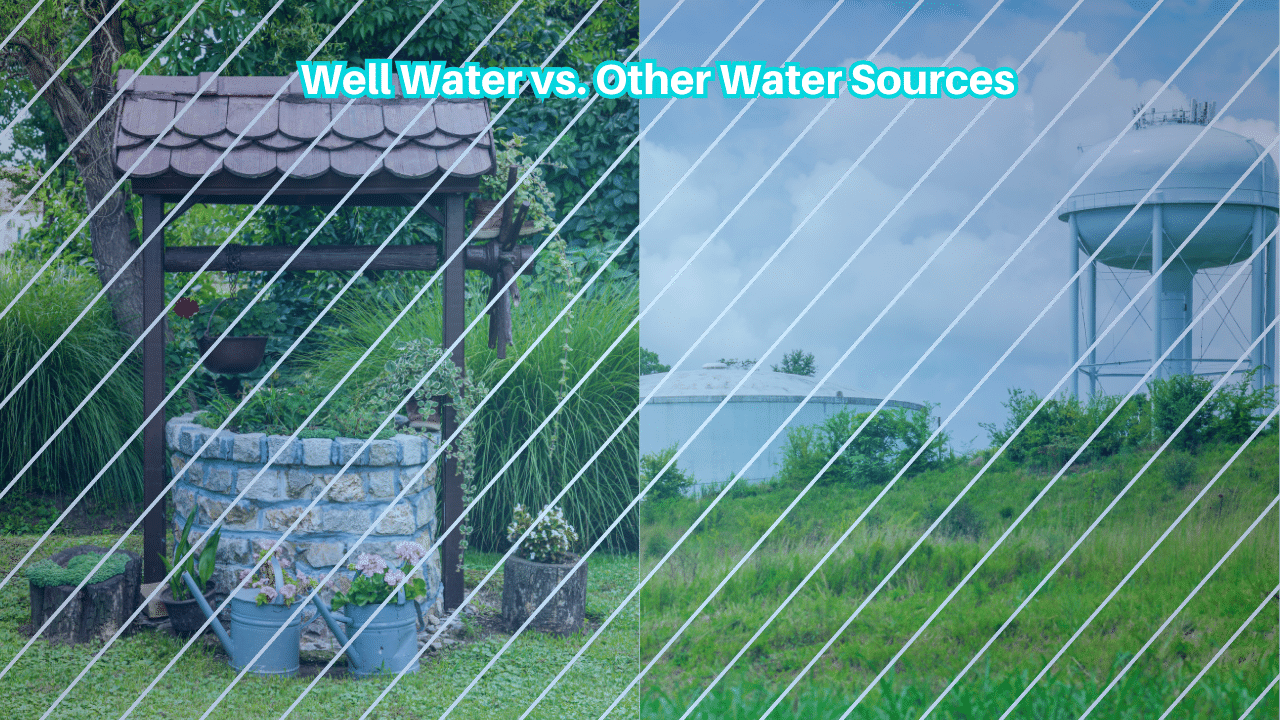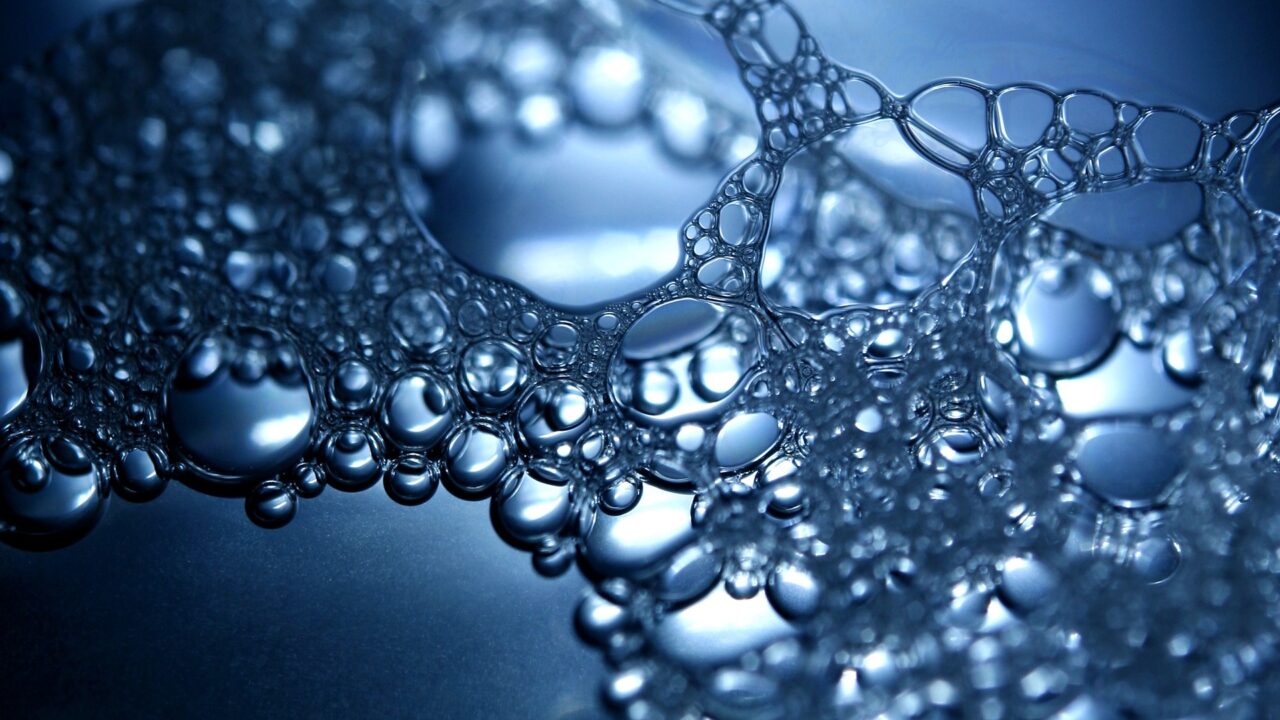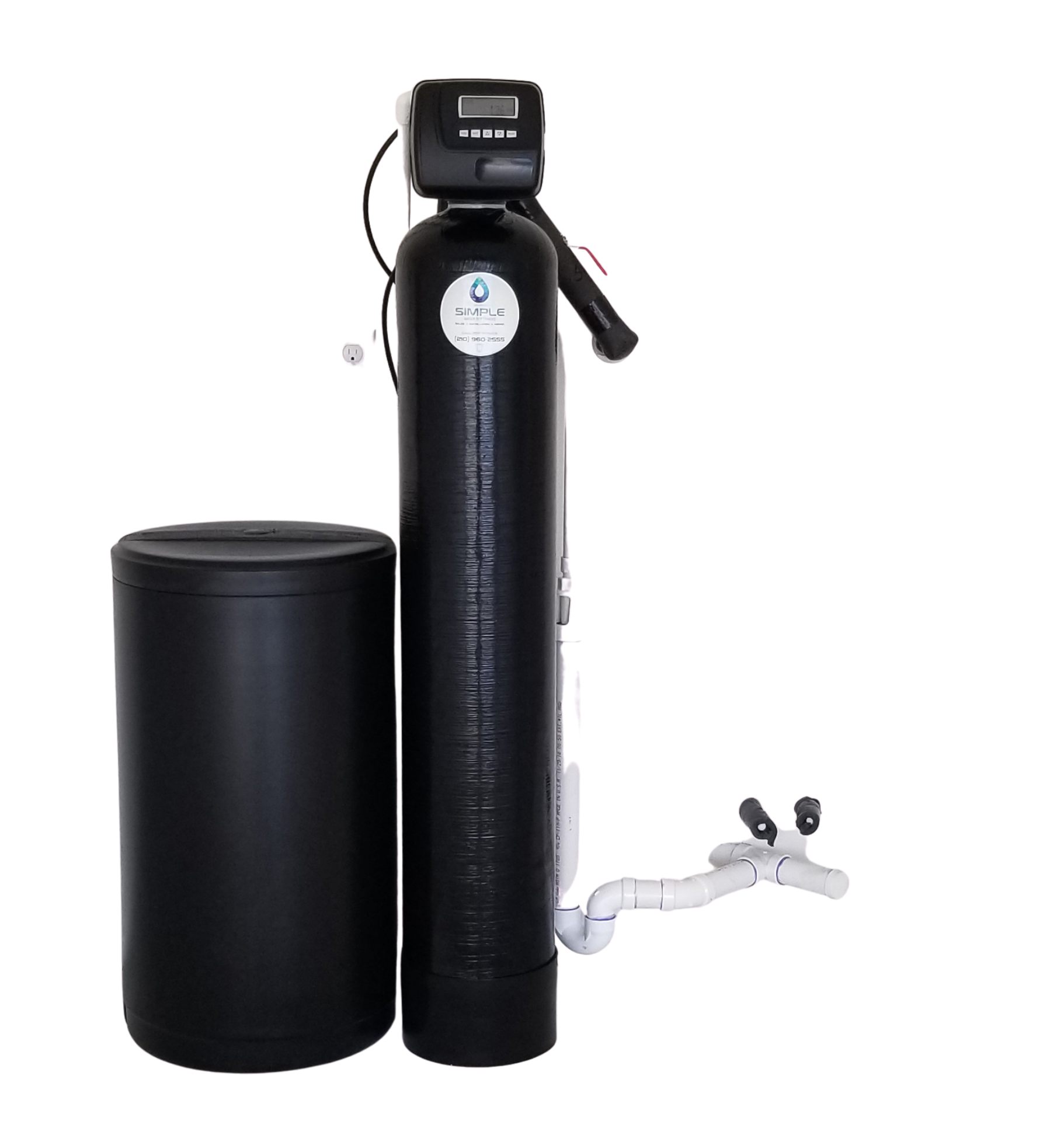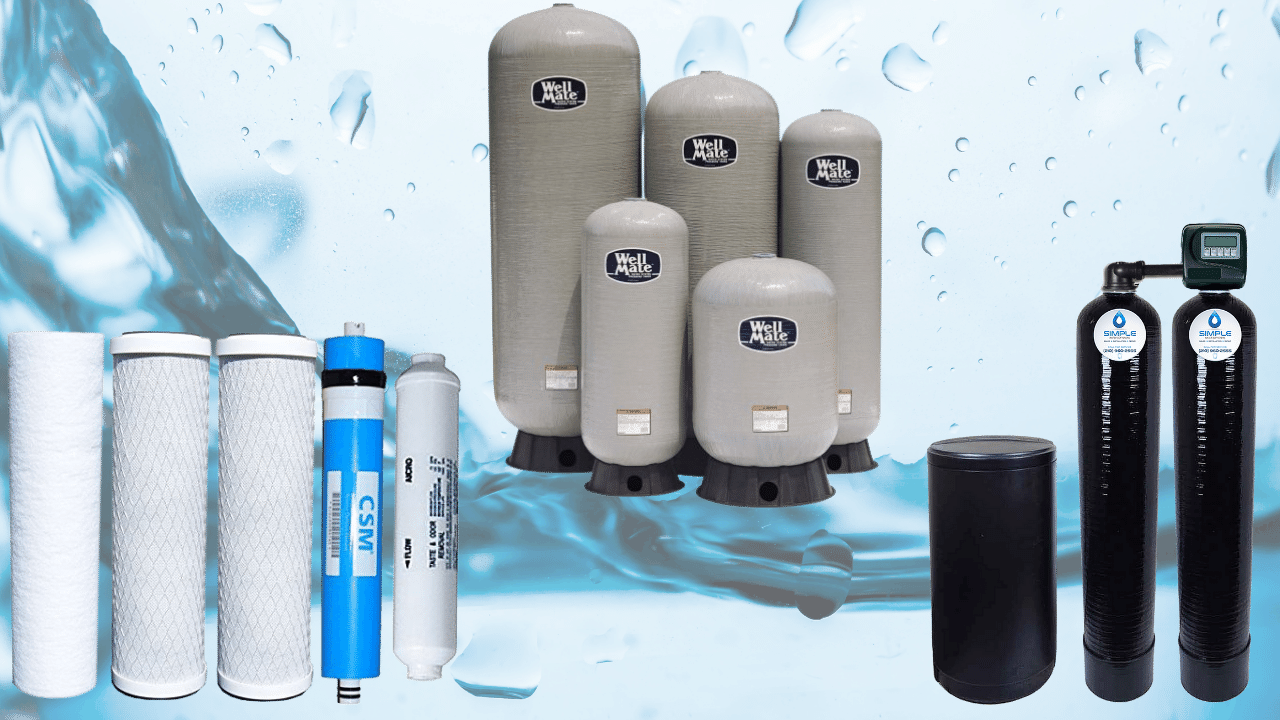The Best Well Water Softener System in San Antonio Texas
Each of our Well Water Softeners Systems units are designed specifically for the location they will be installed. We understand wells are not the same as city water. Wells need to be looked at individually. There is a lot of determining factors into exactly what needs to go into a system for softening the water when at a well. First is it the quality of water you want coming into your house? Does it have iron? Does it have a Sulphur smell? Does it need to be treated before the softener?
We will be happy to test your water and come up solutions for you to have good quality water to use in your house and to drink.
Contrasting the Qualities: Well Water Vs. Other Water Sources

Water is an essential element of life, and the source from which one acquires this crucial commodity can significantly influence its quality, taste, and overall health benefits. Our focus today is on making a comprehensive comparison between well water and other water sources. We aim to shed light on the key differences and aid you in making an informed decision for your water needs.
Well Water: Untouched and Pure
Well water, as the name suggests, is water drawn from a well tapping into an underground source. One of the significant merits of well water is its natural purity. Unlike surface water, it is less exposed to environmental pollutants and the risk of immediate contamination is comparably low.
Well water is usually rich in essential minerals like calcium, magnesium, and potassium because it directly filters through layers of soil and rocks. These minerals not only contribute to the taste but also offer numerous health benefits.
However, it’s not all roses. Well water can contain harmful substances such as arsenic and radon that naturally occur in the soil. Therefore, periodic testing is necessary to ensure safety. Moreover, an improperly constructed or maintained well can risk contamination.
Other Water Sources: Treated, But Is It Better?
The term ‘other water sources’ broadly includes surface water (rivers, lakes, rainwater) and municipal water. These sources are treated to meet safety standards, but the quality may vary.
Municipal water typically undergoes a rigorous treatment process involving filtration and disinfection. While this process successfully eliminates most pathogens, it often involves chlorine, which can impart an undesirable taste and odor.
It’s also worth noting that while municipal water is regulated, it can still contain traces of contaminants such as lead, especially if delivered through older pipes. The risk of contamination also increases due to the vast network of pipes it travels through before reaching your tap.
Surface water from rivers and lakes is abundant but is the most susceptible to pollution, with contaminants ranging from industrial waste to agricultural runoff. It requires substantial treatment before it’s fit for consumption.
Another point of contention is the depletion of minerals during treatment. While necessary to remove potential contaminants, the extensive processes that municipal and surface water undergo can strip away beneficial minerals, affecting the taste and nutritional value.
The Verdict: What Should You Choose?
Whether well water or other water sources are better depends largely on individual circumstances like location, accessibility, and personal preference. Well water offers mineral-rich, tasty water straight from the earth, but it requires diligent management and testing. Meanwhile, other water sources provide treated water that meets safety standards but may fall short in taste and mineral content.
Always remember that water quality can impact not only your health but also the longevity of your appliances and the environment. Therefore, regardless of the source, regular testing and appropriate treatment are indispensable.
In conclusion, the decision is not about choosing well water over other sources or vice versa. It’s about understanding the pros and cons of your available options and making an informed choice that suits your needs and guarantees safe, clean, and healthy water.
Quality of Our Simple Well Water Softener Systems in San Antonio Texas
CLACK VALVE: High quality valve built in the U.S.A. Clack corporation originated in 1946 in Wisconsin has become a world leader in the manufacturing and distribution of water treatment products and components. Meter on demand system. Regenerates only when necessary. Low maintenance.
ENPRESS TANK: 20% stronger than other tanks. One of the highest quality built for the water industry. Industry exclusive copolymer polypropylene formulation for the liner assembly that is far superior. Vortech distribution system utilizing a more efficient distributor plate. Cleaning the resin better for the impurities in well water.
- 1” Flow throughout valve.. (GPM 27, drop PSI 15) exceeds industries requirements.
- Resin: Upgraded to 10% Resin
WARRANTY
- 10 Years on Resin Tank
- 5 Years on Control Valve & Brine Tank
- 3 Years Labor & Resin
- 1 year on Plumbing
We pledge to you to stand behind our equipment. Making it Simple for you to own a Simple Water Softener. Any warranty work will be done at no cost to you with us taking care of all paperwork.
Understanding the Differences in Water Softeners: Well Water Vs. Other Sources

As we increasingly recognize the importance of water quality in our daily lives, one aspect deserves careful attention – water softening. Understanding the unique differences between water softeners for well water and other sources plays a pivotal role in maintaining the longevity of your appliances, the quality of your water, and ultimately, your wellbeing. This article explores the subtle yet critical differences between these two types of water softeners for a well-informed decision.
Hard water is a universal problem that transcends geographic locations. Whether sourced from your municipal supply or a private well, hard water can wreak havoc on plumbing systems, appliances, and even on your skin and hair. Hence, the need for efficient water softening solutions. However, it’s crucial to realize that well water presents a different set of challenges compared to water from other sources due to its exposure to various environmental factors.
Well Water Softener System
Well water, derived directly from the ground, is typically untreated; implying its mineral content, along with potential contaminants, is higher. In contrast, city water undergoes treatment processes to remove most contaminants, yet it can still contain a high level of minerals like calcium and magnesium, which leads to hardness.
When it comes to choosing a water softener for well water, you need to consider its ability to handle a higher level of hardness and potential impurities. Well water softeners are generally more robust and have a more substantial filtration system to eliminate iron, sediment, and other contaminants effectively. They often include an iron filter and a sediment pre-filter, making them comprehensive water treatment solutions.
Water softeners for water from other sources
On the other hand, water softeners for city or municipal water do not need to battle against iron and sediment. Their primary focus is on reducing the hardness of water by exchanging the calcium and magnesium ions with sodium ions. As such, they typically feature a simpler design with a focus on ion exchange processes.
Furthermore, it’s worth mentioning that well water conditions can drastically vary from one location to another. Therefore, it’s crucial to have your well water tested before investing in a specific water softener. You need to understand the unique characteristics of your water source to select the most suitable solution.
In conclusion, while the basic functionality of a water softener remains the same – to reduce water hardness – the differences in water softeners for well water and other sources lie in their design, capacity, and additional features. For well water, you need a comprehensive treatment system that can cope with higher levels of contaminants and hardness. For city water, a simple ion-exchange softener might suffice.
By understanding these differences, you can make informed decisions about water treatment in your home, ensuring optimal performance and a long lifespan for your appliances, all while securing the highest water quality for you and your family. Remember, your water softening needs depend significantly on your water source, so choose wisely.

Financing Available with Approved Credit for all of Our Well Water Softener Systems in San Antonio Texas!
All sizes are available up to 450k
- Not plumbed for Water Softener, we will make it Simple for you to get quality soft water for your family. Job sites quoted on an individual basis.
- Soft Water Hose Bib at softener $35.
- Stainless Steel Jacket $135.
Ask for our:
SIMPLE 45K WELL UNIT
SIMPLE 60K WELL UNIT
SIMPLE 90K WELL UNIT
Delving into the Different Types of Well Water Softeners Systems

You likely know the agony that hard water can bring into your household if you are relying on well water. The damaging effects of hard water on your fixtures, pipes, appliances, and even on your skin and hair, are starkly apparent. Thus, the need for a well water softener is not a matter of luxury, but an absolute necessity.
Well water softeners are innovative systems that work to reduce the hardness of water by eliminating minerals such as calcium and magnesium that attribute to its hardness. Let’s dive into the different types of well water softeners available in the market today and explore how each works to give you a constant supply of soft water.
Salt-Based Ion Exchange Softeners
Regarded as the most common type of well water softener, salt-based ion exchange units swap hard ions like calcium and magnesium with softer ions, sodium or potassium. Two tanks are involved: one filled with special resin beads, the other with brine. As the well water passes through the unit, the hard ions are captured, leaving you with softened water.
Salt-Free Water Softeners
These softeners function using a potassium-chloride salt substitute rather than sodium. This makes them the best choice for individuals who are concerned about salt intake. The system does not entirely remove the hard minerals; instead, it transforms their nature so they don’t accumulate in appliances or pipes as lime scale.
Dual-Tank Water Softeners
If your household uses a significant amount of water, a dual-tank water softener might be an excellent choice. When one tank is regenerating, the other is fully functional to ensure you never run out of soft water. Although these systems may occupy more space and be more expensive, their benefits are worth the investment for large households.
Magnetic Water Softeners
Also known as electronic or digital softeners, magnetic water softeners are the latest entrants into the water softening market. These devices work by producing a magnetic field that alters the electromagnetic properties of the calcium-carbonate minerals, preventing them from being deposited as scale.
Portable Water Softeners
For those constantly on the move, portable water softeners are your answer to soft water. These compact devices are easy to carry around but still offer all the benefits of a standard home-based system. Whether you’re out camping or on a boating trip, these devices ensure you don’t miss out on the benefits of softened water.
In conclusion, the type of well water softener system you choose largely depends on your individual needs, preferences, and budget. Each type presents unique features and advantages that may appeal differently to different homeowners. When making your selection, consider factors such as the hardness of your water, the size of your household, and the environmental impact. With the right well water softener, you can bid farewell to hard water woes and welcome a world of softer, cleaner, and healthier water.
Request a Free Estimate Today for Your Well Water Softener System in San Antonio Texas
Please use the form below to request a free estimate and we’ll be back in touch with you as soon as possible. Alternatively you can give us a call at (210) 960-2555 for immediate Pricing and scheduling.


